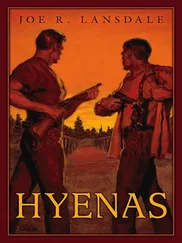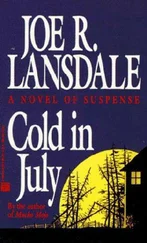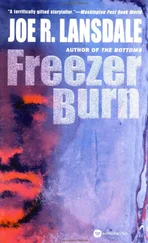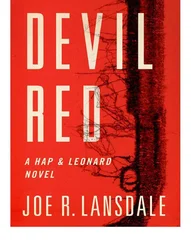Slater shook shit and seawater out of his pants legs and followed the rope around his waist to the support post. He got hold of the post, felt for the rest of the rope. In the darkness, he cried out, “Bernard. You there?”
“I think so,” came Bernard’s voice from the darkness. And then they heard a couple of bolts pop free, fire off like rifle blasts. Then: “Oh, Jesus,” Bernard said. “Feel that swell? Here it comes again.”
Slater turned his head and looked out. There was nothing but a great wall of blackness moving toward them. It made the first great wave seem like a mere rise; this one was bigger than the Great Wall of China.
10:00 P.M.
Bill and Angelique lay on the bed with Teddy. The water was washing over the edges of the feather mattress, blowing wet, cold wind over them. They had started the Edison and a gospel record had been playing, but the wind and rain had finally gotten into the mechanism and killed it.
As it went dead, the far wall cracked and leaned in and a ripple of cracking lumber went across the floor and the ceiling sagged and so did the bed. Bess suddenly disappeared through a hole in the floor. One moment she was there, the next she was gone, beneath the water.
Bill grabbed Angelique by the arm, pulled her to her feet in the knee-deep water. She held Teddy close to her. He pulled them across the room as the floor shifted, pulled them through the door that led onto the unfinished deck, stumbled over a hammer that lay beneath the water, but managed to keep his feet.
Bill couldn’t help but think of all the work he had put in on this deck. Now it would never be finished. He hated to leave anything unfinished. He hated worse that it was starting to lean.
There was one central post that seemed to stand well enough, and they took position behind that. The post was one of several that the house was built around; a support post to lift the house above the normal rise of water. It connected bedroom to deck.
Bill tried to look through the driving rain. All he could see was water. Galveston was covered by the sea. It had risen up and swallowed the city and the island.
The house began to shake violently. They heard lumber splintering, felt it shimmying. The deck swayed more dynamically.
“We’re not going to make it, are we, Bill?” Angelique said.
“No, darling. We aren’t.”
“I love you.”
“I love you.”
He held her and kissed her. She said, “It doesn’t matter, you and I. But Teddy. He doesn’t know. He doesn’t understand. God, why Teddy? He’s only a baby… How do I drown, darling?”
“One deep breath and it’s over. Just one deep pull of the water, and don’t fight it.”
Angelique started to cry. Bill squatted, ran his hand under the water and over the deck. He found the hammer. It was lodged in its spot because it was caught in a gap in the unfinished deck. Bill brought the hammer out. There was a big nail sticking out of the main support post. He had driven it there the day before, to find it easily enough. It was his last big nail and it was his intent to save it.
He used the claw of the hammer to pull it out. He looked at Angelique. “We can give Teddy a chance.”
Angelique couldn’t see Bill well in the darkness, but she somehow felt what his face was saying. “Oh, Bill.”
“It’s a chance.”
“But…”
“We can’t stand against this, but the support post —”
“Oh Lord, Bill,” and Angelique sagged, holding Teddy close to her chest. Bill grabbed her shoulders, said, “Give me my son.”
Angelique sobbed, then the house slouched far to the right — except for the support post. All the other supports were washing loose, but so far, this one hadn’t budged.
Angelique gave Teddy to Bill. Bill kissed the child, lifted him as high on the post as he could, pushed the child’s back against the wood, and lifted its arm. Angelique was suddenly there, supporting the baby. Bill kissed her. He took the hammer and the nail, and placing the nail squarely against Teddy’s little wrist, drove it through the child’s flesh with one swift blow.
Then the storm blew more furious and the deck turned to gelatin. Bill clutched Angelique, and Angelique almost managed to say, “Teddy,” then all the powers of nature took them and the flimsy house away.
High above it all, water lapping around the post, Teddy, wet and cold, squalled with pain.
Bess surfaced among lumber and junk. She began to paddle her legs furiously, snorting water. A nail on a board cut across her muzzle, opening a deep gash. The horse nickered, thrashed its legs violently, lifted its head, trying to stay afloat.
SUNDAY, SEPTEMBER 9, 4:00 A.M.
The mechanism that revolved the Bolivar lighthouse beam had stopped working. The stairs that led up to the lighthouse had gradually filled with people fleeing the storm, and as the water rose, so did the people. One man with a young boy had come in last, and therefore was on the constantly rising bottom rung. He kept saying, “Move up. Move up, lessen’ you want to see a man and his boy drown.” And everyone would move up. And then the man would soon repeat his refrain as the water rose.
The lighthouse was becoming congested. The lighthouse tower had begun to sway. The lighthouse operator, Jim Marlin, and his wife, Elizabeth, lit the kerosene lamp and placed it in the center of the circular magnifying lens, and tried to turn the beam by hand. They wanted someone to know there was shelter here, even though it was overcrowded, and might soon cease to exist. The best thing to do was to douse the light and hope they could save those who were already there, and save themselves. But Jim and Elizabeth couldn’t do that. Elizabeth said, “Way I see it, Jim. It’s all or nothing, and the good Lord would want it that way. I want it that way.”
All night long they had heard screams and cries for help, and once, when the lighthouse beam was operating, they had seen a young man clinging to a timber. When the light swung back to where the young man had been, he had vanished.
Now, as they tried to turn the light by hand, they found it was too much of a chore. Finally, they let it shine in one direction, and there in the light they saw a couple of bodies being dragged by a large patch of canvas from which dangled ropes, like jellyfish tentacles. The ropes had grouped and twisted around the pair, and the canvas seemed to operate with design, folded and opened like a pair of great wings, as if it were an exotic sea creature bearing them off to a secret lair where they could be eaten in privacy.
Neither Jim nor Elizabeth Marlin knew the bloated men tangled in the ropes together, had no idea they were named Ronald Beems and Forrest Thomas.
5:00 A.M.
A crack of light. Dawn. Jim and Elizabeth had fallen asleep leaning against the base of the great light, and at the first ray of sunshine, they awoke, saw a ship’s bow at the lighthouse window, and standing at the bow, looking in at them, was a bedraggled man in uniform, and he was crying savagely.
Jim went to the window. The ship had been lifted up on piles of sand and lumber. Across the bow he could see the letters PENSACOLA . The man was leaning against the glass. He wore a captain’s hat. He held out his hand, palm first. Jim put his hand to the glass, trying to match the span of the crying captain’s hand.
Behind the captain a number of wet men appeared. When they saw the lighthouse they fell to their knees and lifted their heads to the heavens in prayer, having forgotten that it was in fact the heavens that had devastated them.
6:00 A.M.
The day broke above the shining water, and the water began to go down, rapidly, and John McBride sat comfortably on the great hour hand of what was left of the City Hall clock. He sat there with his arms wrapped around debris that dangled from the clock. In the night, a huge spring mechanism had jumped from the face of the clock and hit him a glancing blow in the head, and for a moment, McBride had thought he was still battling the nigger. He wasn’t sure which was worse to fight. The hurricane or the nigger. But through the night he had become grateful for the spring to hold on to.
Читать дальше











